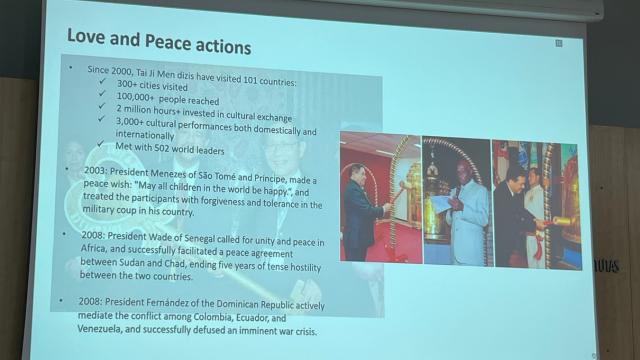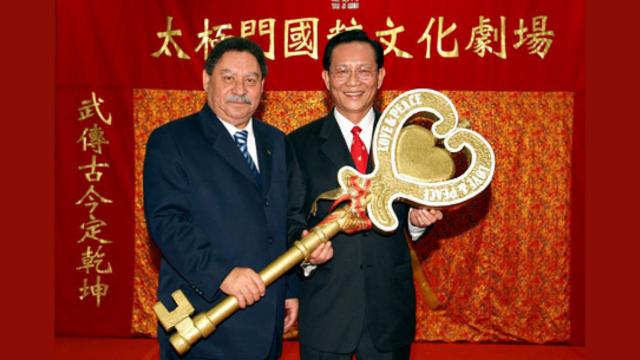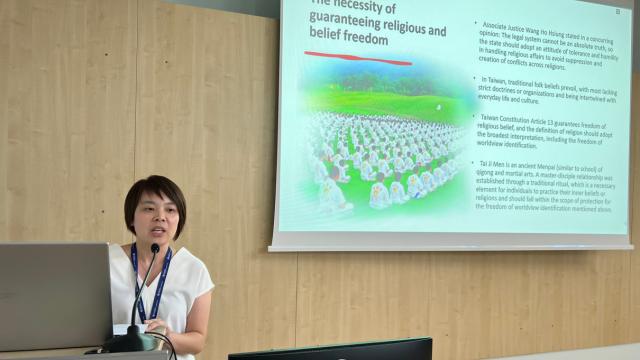It developed a three-fold strategy: peacefully protest and use all available legal remedies; continue its international activities on behalf of peace and love; nurture the body and mind of disciples through the practice of qigong.
by Shelly Tu*
*A paper presented at the CESNUR 2023 international conference, Vilnius, Lithuania, June 21, 2023

Religious belief entails unwavering faith in an ultimate source, principle, or value, which may conflict with the secular nature of the state. To avoid suppressing religion and causing conflicts, the state should approach religious affairs with tolerance and humility, recognizing that its legal system is not an absolute truth. In Taiwan, where traditional folk beliefs are intertwined with daily life, Article 13 of the Constitution safeguards freedom of religious belief, encompassing the broadest interpretation of religion, including the freedom of identifying with a particular worldview.
During the investigation of the Tai Ji Men case, false information was spread by Prosecutor Hou through the media, with numerous reports and TV interviews aimed at creating a negative public perception. The attacks extended beyond the media, with incidents such as smashed cars and verbal abuse targeting Tai Ji Men dizi. I was once a topic of gossip at school when I was 9, which is not a rare case among the brothers and sisters of my age. Even after the Supreme Court’s acquittal in 2007, the negative stigma persisted. My colleagues at work continued to view me as a member of a “tax evasion cult,” and my parents-in-law had to practice qigong secretly at Tai Ji Men in the night after their relatives fell asleep. Many Tai Ji Men dizi faced pressure and had to choose between their faith and family relationships, with some even being forced to sever ties with loved ones. Despite efforts to explain, the preconceived negative impressions of Tai Ji Men remained deeply ingrained. Many Tai Ji Men dizi were put under various pressures and were forced to make choices between their faith and family relationships.
How did we react to this crisis? I would distinguish between three different strategies of reaction. First, we reacted peacefully through protests and all possible legal, administrative, and political avenues open to us.

Following the case, Tai Ji Men dizi exhaustively pursued administrative remedies, including tax relief and thousands of petitions to government agencies. More than 20,000 petition letters were submitted, with the involvement of over three hundred legislators in petitioning, co-signing, and holding public hearings, requesting the National Taxation Bureau to withdraw illegal tax bills. We engaged in street protests and forums to reveal the truth and advocate for tax and legal reform.
During the process, some suggested that Tai Ji Men negotiate with the National Taxation Bureau and pay a little more in taxes. Indeed, negotiation is a relatively simple and commonly chosen approach for most individuals, companies, or organizations. In our case, Dr. Hong insisted on fundamental principles of discerning truth from falsehood, right from wrong, and good from bad—we should not underpay a single penny of the taxes we owed but also, we should not overpay a single penny of taxes we did not owe.
This inspired silenced tax victims of other cases to speak up, leading to the formation of the Tax and Legal Reform League. Numerous human rights violations, such as house auction due to an unpaid 600-dollar bill, and 1,600 job losses affecting numerous families due to an erroneous tax bill, were uncovered. Through community education and activism, the attention to taxpayers’ human rights increased. Professor Huang Chun-Chieh, a member of the Presidential Office Human Rights Consultative Committee, affirmed Tai Ji Men’s stance, stating that “The leader of Tai Ji Men is a responsible master. If it shouldn’t be paid, then it shouldn’t be paid. This is what it truly means to pursue justice.”
A second part of the response strategy was to continue our normal activities. Basically, we kept doing what we had always done. We kept promoting love and peace, both in Taiwan and internationally.

Tai Ji Men has been invited ten times and participated in the National Day Ceremony eight times, receiving recognition and praise from leaders in various fields. My brother and I used to take a 4-hour bus at midnight to join our brothers and sisters for rehearsal every weekend, despite the physical tiredness and the challenges from bad weather. Because we have only one goal: to show the world what Tai Ji Men is and to convey the goodness we have learned in Tai Ji Men through our actions. It is also the process through which I grew in perseverance and became braver and more confident.
In September 2001, Dr. Hong led his dizi to attend the 54th session of the UN General Assembly in New York and was invited by the mayor of Honolulu for a cultural exchange event in Hawaii. However, their visit coincided with the shocking terrorist attacks of 9/11. While everyone tried to flee from New York, Dr. Hong and his wife chose to stay and held a bell-ringing ceremony on Manhattan TV to bring solace and tranquility and pray for the stability of people’s hearts.
Dr. Hong later insisted on keeping the promise and flew to Honolulu to hold another bell-ringing ceremony there, despite the critical situation. The mayor of Honolulu, Jeremy Harris, deeply moved by Tai Ji Men’s actions, expressed gratitude and admiration for the contributions of the Tai Ji Men in promoting love and peace. He awarded Dr. Hong the honorary citizenship of Honolulu and proclaimed September 16 as “Tai Ji Men Qigong Academy and Dr. Hong’s Day.”
Since 2000, Tai Ji Men dizi have visited over 300 cities, reaching more than 100,000 people and investing over two million hours in cultural exchange activities, all at their own expenses. They have participated in over 3,000 cultural performances both domestically and internationally, and met with 502 world leaders, including heads of state and Nobel Peace Prize laureates. Several presidents from different countries have already put their peace commitments into practice. Among those who rang the Bell of World Peace and Love, President Menezes of São Tomé and Príncipe forgave coup participants, fulfilling his peace wish. President Wade of Senegal facilitated peace between Sudan and Chad, while President Fernández of the Dominican Republic mediated conflicts among Colombia, Ecuador, and Venezuela, saving countless lives.

Thirdly, there was an internal response to the crisis. We continued our practices aimed at enhancing the physical, mental, and spiritual well-being of individuals, which is the essence of Tai Ji Men.
Tai Ji Men dizi practice qigong and martial arts, enabling individuals to transform their lives through personal change. Health is restored, relationships are improved, and wisdom is utilized to overcome crises in various aspects of life. I used to trouble my mother for attention when I was a child, not realizing I wanted more time with her until years later. I intentionally made her angry, hurting her despite loving her. Recalling Shifu’s teachings that “love must be timely,” I mustered the courage to call and apologize to my mother, and tell her that I love her, which is not an easy and common practice in Asian culture. As I conveyed my love, she was deeply moved, and I felt no regrets after sharing my profound feelings. Now, I tell my daughter I love her every day. It is through such practical improvements that I gain confidence and a happier life, equipping myself with energy and capability to care for more people around me.
Despite 27 years of persecution, Tai Ji Men remains dedicated to love, peace, and personal growth. During a visit to Kosovo, the Minister of Culture sought Dr. Hong’s advice on achieving love and peace in the tormented European country, to which he responded, “Just make everyone smile.” This vision can be achieved by each and every one of us. Tai Ji Men persists in promoting good deeds and correcting wrongs, even in the face of adversity, and in proclaiming its aim to create a world of justice and righteousness. Through their actions, Tai Ji Men dizi try to embody virtuous conduct and nurture conscience in people’s hearts, ensuring the continuation of benevolent ideals for future generations. These principles align with the core values of all religions and beliefs, as expressed by Dr. Hong in the 1999 World Love and Peace Declaration, “We believe that only sincere goodwill can touch the deep desire and resonance for equality within the human soul.”
Source: Bitter Winter

